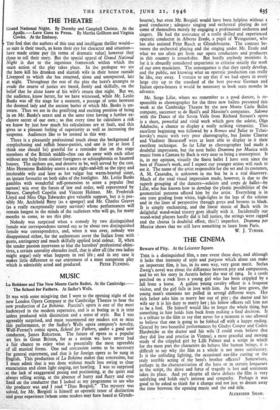THE THEATRE
Grand National Night. By Dorothy and Campbell Christie. At the Apollo.—Love Goes to Press. By Martha Gellhorn and Virginia Cowles. At the Embassy.
You feel that the authors of this taut and intelligent thriller would— so sure is their touch, so keen their eye for character and situation— have made crime pay (in terms of dramatic value) however they chose to tell their story. But the special appeal of Grand National Night is due to the ingenious framework within which the main action of the play takes place. In the prologue we see the hero kill his drunken and sluttish wife in their house outside Liverpool to which she has returned, alone and unexpected, late at night. Throughout the rest of the play the hero's attempts to evade the course of justice are based, firmly and skilfully, on the belief that he alone knew of his wife's return that night. But we, the audience, know better, for we have witnessed, while Mr. Leslie Banks was off the stage for a moment, a passage of arms between the doomed lady and the ancient butler of which Mr. Banks is un- aware. Thus we are in the gratifying and exciting position of being in on Mr. Banks's secret and at the same time having a further ex- clusive secret of our own ; so that every time he calculates a risk we know by just how much his calculations are at fault, and this gives us a pleasant feeling of superiority as well as increasing the suspense. Audiences like to be treated in this way.
There is a pleasantly professional touch about the background of steeplechasing and raffish house-parties, and one is (or at least I think one should be) grateful for a reminder that on the stage members of the British middle-class can do away with each other without any help from sinister foreigners or schizophrenia or haunted houses. The authors are, and deserve to be, well served by the cast. Miss Hermione Baddeley scores a neat right-and-left as the tipsy and intolerable wife and later as her vulgar but warm-hearted sister, an instant favourite on both sides of the footlights. Mr. Leslie Banks ganibles with wonderful self-possession to score a popular (but narrow) win over the forces of law and order, well represented by Messrs. Campbell Copelin and Vincent Holman. Mr. Frederick Lloyd and Miss Olga Edwardes give valuable support, but it is pos- sibly Mr. Archibald Batty (as a sponger) and Mr. Charles Graves (as a really exceptionally trusty servitor) whose performances will remain longest in the minds of the audiences who will go, for many months to come, to see this play.
Nobody was surprised when a comedy by two distinguished female war correspondents turned out to be about two distinguished female war correspondents, and, when it was over, nobody was disappointed either, for the authoresses cover the Italian front with gusto, astringency and much skilfully applied local colour. If, when the tender passion intervenes to blur the heroines' professional objec- tives, a certain unreality obtrudes itself, that is after all (the two ladies might argue) only what happens in real life ; and in any case it makes little difference to our enjoyment of a most competent play which is admirably acted and produced. PETER FLEMING.


























 Previous page
Previous page